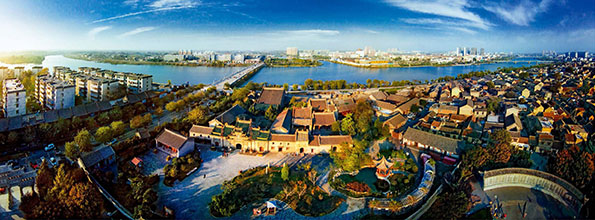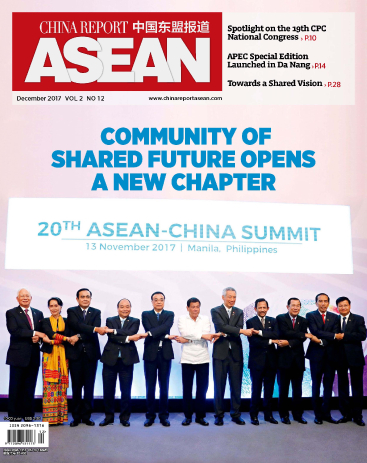
An aerial view of Bozhou.
Bozhou, in central China's Anhui Province, is famous for its long history and culture. Since ancient times, it has been known as “the capital of medicine”. It boasts history of more than 1,800 years since Hua Tuo (145-208), a native of Bozhou and an ancient Chinese physician, built the first medicinal garden in the city.
In recent years, Bozhou has made full use of its own advantages and has concentrated on efforts to transform and develop. Industries such as modern Chinese medicine, modern food and beverage and the application of a new generation of information technology have grown rapidly. Bozhou has become a leader in efforts to revitalize northern Anhui.
Secretary of the CPC Bozhou Municipal Committee Wang Yiguang said that Bozhou encourages pharmaceutical companies to conduct mergers and reorganization in order to promote the transfer, research and development and cultivation of drug technology. The city has also been actively boosting city construction focused on a healthy lifestyle, working toward the goal of achieving 100 billion yuan (US$15.1 billion) in modern Chinese medicine total output value by 2020. The total volume of traditional Chinese medicine (TCM) trade in the city is also expected to exceed 100 billion yuan by 2020, making Bozhou the world capital of TCM.
Forging the Capital of TCM
Building Bozhou as the global capital of TCM not only is an important effort made by the CPC Anhui Provincial Committee and the Anhui provincial government, but is also an important measure taken by the CPC Bozhou Municipal Committee and the Bozhou municipal government to promote the leap-forward development of the TCM industry.
In recent years, Bozhou has hosted the International (Bozhou) TCM Expo and National (Bozhou) TCM Trade Fair, relying on the aggregate development base of the TCM industry and giving full play to the advantages of Chinese medicinal crop resources in order to develop the TCM sector. A complete modern TCM industrial system has gradually formed to include medicinal crop plantations, processing of decoction materials, medicine production, trade and logistics, healthcare, science and education, as well as research and development. Bozhou's core competitiveness and brand influence have been significantly improved, which has effectively and rapidly promoted economic and social development.
More than half of China's top 100 pharmaceutical companies have settled in Bozhou, of which 168 are GMP-certified (Good Manufacturing Practice — a World Health Organization standard covering laws and regulations governing food, drugs, medical product manufacturing and quality management). Bozhou is approved as the Anhui provincial-level production base of formula granule, and is listed in the first batch of cluster development bases of strategic emerging industries in Anhui. There are 145 companies listed on the Bozhou board of modern TCM and health industry at the Anhui Shares Depository and Clearing Company. Bozhou has also built China's only national-level quality supervision and inspection center for Chinese medicinal herbs and successfully applied the first batch of TCM health tourism demonstration zones in China. It has also been granted the honorary title of Belt and Road International Health Tourism Destination. Bozhou's influence and dominance in the TCM field has continued to increase, and its brand awareness and reputation have improved.
Fang Shuting, president of China Association of Traditional Chinese Medicine, said at the opening ceremony of the 2017 International (Bozhou) TCM Expo (IBTE) that Bozhou, focusing on the development orientation of “the global capital of TCM”, has been market-oriented and taken technological innovation as the driving force in order to vigorously develop TCM agriculture, improve the TCM industry, expand the TCM business, optimize the TCM service sector and strive to promote the transformation from resource advantages to industrial advantages. Bozhou has been making every effort to expedite the modernization of TCM in its internationalization process so as to achieve leap-forward development of TCM.
Deputy Director General of the State Administration of Traditional Chinese Medicine Ma Jianzhong said that Bozhou succeeds thanks to its geographic and resource advantages and has seized opportunities to develop. It has also been innovative in the aim to actively promote the development of TCM and its related industries. The competitiveness of the TCM industry in Bozhou has continued to improve, its industrial structure and level has continued to be adjusted and optimized and its industrial chain has been further expanded.
In recent years, Bozhou has insisted on prioritizing the modern TCM industry, promoting a strategy of developing the city based on TCM, encouraging pharmaceutical companies to conduct mergers and reorganizations and supporting drug research, development and cultivation. Bozhou has also focused on the promotion of TCM culture, expanded the TCM industry and pushed forward the innovative development of TCM healthy lifestyle culture. Bozhou's influence and dominance in the TCM field have continued to increase and its awareness and reputation have improved.
TCM on the World Stage
Bozhou has built up a platform for attracting investment by using medicine as a medium, a trade platform by using medicine fairs as a carrier, a cooperation platform aiming at internationalization as a goal and an academic platform of inheriting and innovating TCM culture so as to take full advantage of traditional medicine, speed up the development of the modern TCM industry and promote the construction of the global capital of TCM. This year's IBTE added five new events, namely the World TCM (Bozhou) Forum, the Conference on Building the Global TCM Capital, the Conference of China's 2016 Top 100 Pharmaceutical Companies, the International Forum of Chinese Medicine Technology Trading and the “Hua Tuo Cup” National TV Contest of TCM Knowledge.
The World TCM (Bozhou) Forum was sponsored by the World Federation of Chinese Medicine Societies (WFSMS), which set “promoting the development of the TCM trade, serving people's health around the globe” as the theme. TCM experts and scholars from more than 20 countries including China, the United States, Australia, Russia, Germany, Japan, Indonesia, Thailand and Vietnam participated in the forum and exchanged views on global TCM development. The forum also promulgated the international standards of terminology on Chinese medicinal herbs based on WFSMS’ TCM Basic Terms and took seven years to finish. For the first time, some 498 kinds of Chinese medicinal herbs were granted international common names, a landmark achievement in the international standardization of TCM.
At the opening ceremony of the IBTE 2017, relevant department from Chinese authorities awarded Bozhou three national-level honorary titles — Belt and Road International Health Tourism Destination, Research and Evaluation Base for Measures on Chinese Medicinal Herb Technology and Trade and the Capital of the Chinese Tonic Diet. TCM experts from 31 countries and regions, presidents from 28 well-known universities and research institutes across China, more than 200 presidents from TCM hospitals and over 400 entrepreneurs from listed companies and China's top 100 pharmaceutical companies participated in the expo.
The 3rd China (Bozhou) International Health Qigong Expo and 2017 International Health Qigong Wuqinxi Communication and Tournament attracted 200 qigong (breathing exercise) and wuqinxi (meaning “Five Animal Play” in Chinese, a set of exercises devised by Hua Tuo which mimic the movements of five different animals) enthusiasts from a wide range of nations. The Health Qigong Federation International awarded Bozhou the title of “International Capital of Qigong and Wuqinxi”.

Performance of the traditional technique of manual cutting of medicinal herbs.

The opening ceremony of a TCM market in Bozhou.

TCM production is a growing industry in China.


 Copy Reference
Copy Reference